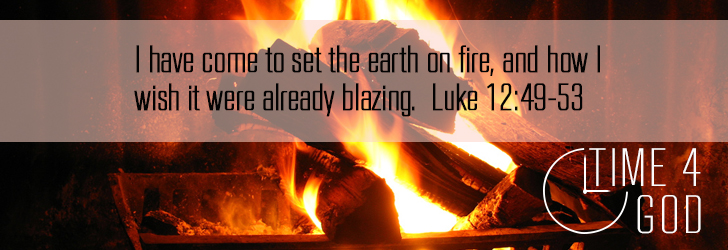Set Afire With Love
When we think of Jesus we usually think of him as sweet, full of loving-kindness and mercy. After all, he is the one who wept at the death of Lazarus, who healed the sick with his tender touch.

The words of this passage in Luke’s Gospel have always been troubling to me. They seem so harsh. When you think about it though, they describe reality all too well.
When we think of Jesus we usually think of him as sweet, full of loving-kindness and mercy. After all, he is the one who wept at the death of Lazarus, who healed the sick with his tender touch. He is all of that, of course, but we have to keep in mind, too, that his ministry caused great dissension, even hatred. It divided families and it divided the Jewish community. He compared the Pharisees to whitened sepulchers for their hypocrisy, and used the examples of “heretical” Samaritans, the one who aided the beaten traveler on the road, and the woman at the well, to challenge the self-righteousness of the Jewish religious leaders, and so much more. He made people angry, because he was showing them their failures and their faults. But he did not do this to condemn them. He did it to get them to reflect within, to “see” their sins, to feel sorrow for them, and to see the wisdom of repentance. He wanted them, and us, to then freely choose out of that wisdom to take the narrow path toward heaven, rather than the many wide and tempting paths of the earth. These are not “easy” things. Why is this so? Because I am full of ego and the foolishness of competition and comparison. It is difficult to walk the path of righteousness, to live the life of Christ in the world, but it is the only true source of our happiness here, and the only way to the joy we all desire and are made for in heaven.
“Do you think I came to establish peace on earth?” (Luke 12:51) Here we see the world through Jesus’ eyes. He came among us because of our sins. Our sins have made the earth a place of contradiction and absurdity. On the one hand it is full of God’s beauty. We see it everywhere, in nature and in the goodness of others. On the other hand, it is also a place full of suffering, tainted by pride, greed, jealousy, lusts of every imaginable kind, angers so deep that they are riven with hatred, gluttonies of every sort, and life-deadening sloth. Ego reigns supreme at the cost of the common good. Why is this? Along with an expansive intellect, rooted in the capacity for reason, and the ability to come to know the difference between good and evil, right and wrong, we have been given a free will. Even when we “know” the difference between good and evil, and their consequences, we still are free to choose one or the other. And we do. This is why fathers and sons, mothers and daughters, sisters and brothers, in-laws, and nations, are often divided.
Jesus wants to set us afire with love. He wants the world to blaze with love. He wants us to burn with the kind of love that Jesus burned with. He wants us to accept the same baptism he accepted on the cross. He wants us to fight the fires of sin, within us and without us, with the purifying fires of his love. When we submit freely and willingly to the love of God, he spills his graces into our hearts, our minds and our souls, filling them with the fires of faith and courage, and he never abandons us. We are in the world, brothers and sisters, but we are not to be of it. Those who freely choose to defy God and his unconditional love, will hate us and will try to silence us, or be rid of us, but they cannot win. For, as Paul suggests, “If God is on our side, who can be against?”
SKM: below-content placeholderWhizzco for FHB

